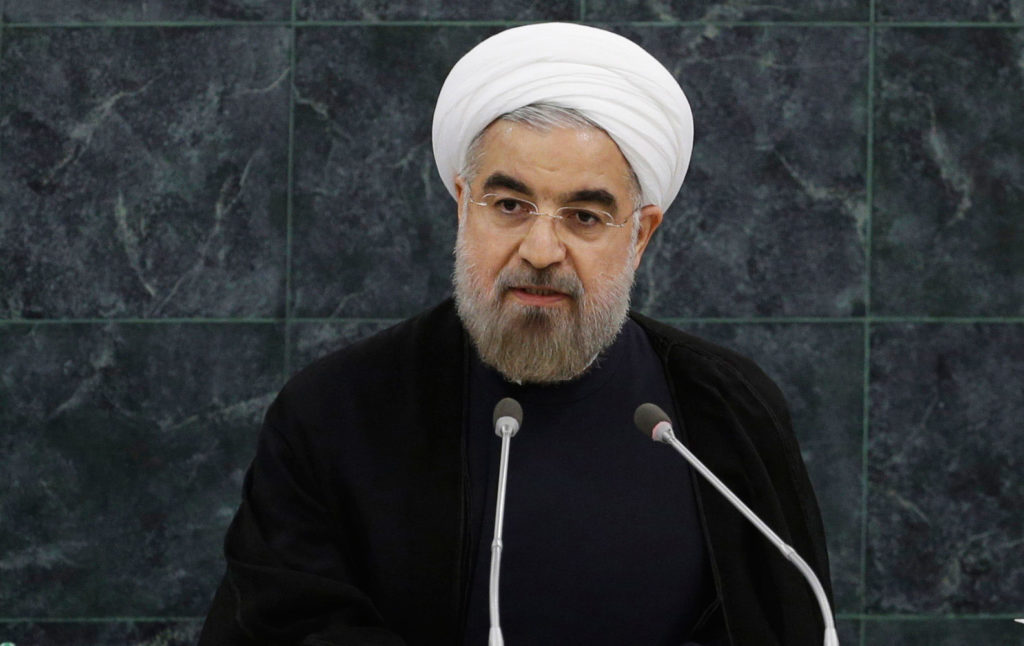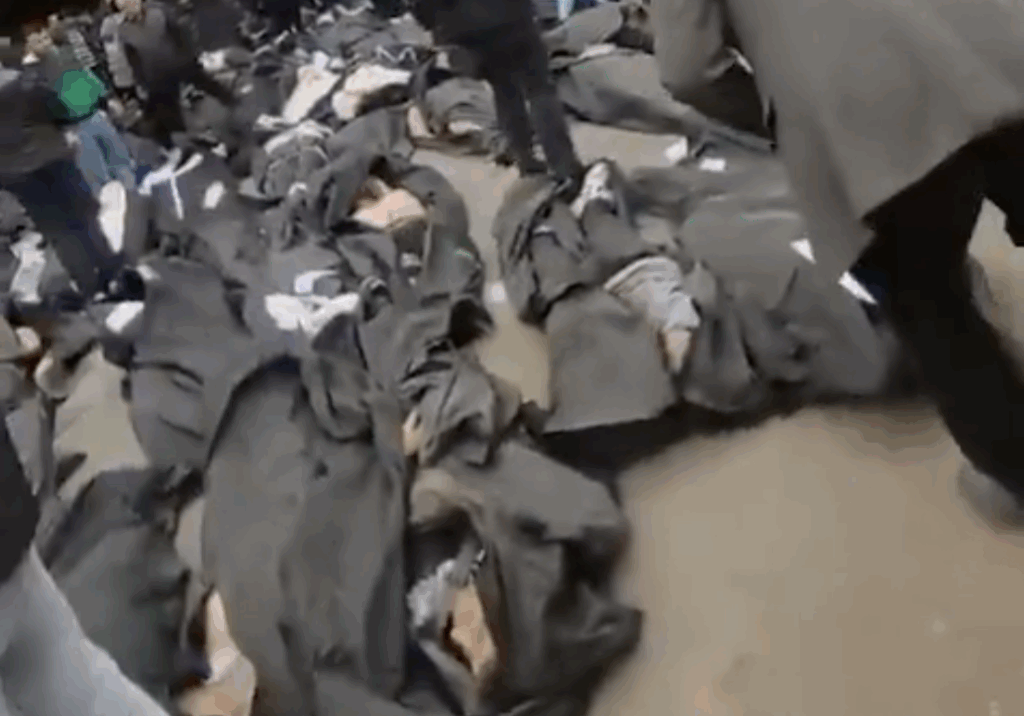Australia/Israel Review
Rouhani: Ruse or Strategic Rethink?
Nov 21, 2013 | Yehonathan Tommer

Yehonathan Tommer
Iranian President Hassan Rouhani had led an international charm offensive since his election in June. There is no doubt that his diplomatic style – and that of those he has chosen to work with him, especially soft-spoken Iranian Foreign Minister Mohammad Javad Zarif with his impeccable English – is a distinct contrast with the deliberately confrontational approach of previous President Mahmoud Ahmedinejad. This new approach had clearly underpinned the latest rounds of negotiations on the nuclear program in Geneva.
But is the change a change of style or substance?
American columnist Thomas Friedman (“Wolf, a Sheep or What?” New York Times, Oct. 5) has argued that “The decision to re-enter negotiations is a clear signal that crucial players [in Iran] do not think the status quo – crushing sanctions – is viable for them anymore.” He has suggested that Western leaders seek ways of helping Iran’s President and his country’s top leadership decide to transform Iran from an isolated rogue state into a responsible “Middle Eastern China”.
By contrast, Israeli Prime Minister Binyamin Netanyahu, who has for decades campaigned against Iran’s steady progress toward a nuclear military capability, seems convinced that Iranian leaders are not actually making any significant strategic adjustment. He sides with those arguing that Rouhani differs from his predecessor Ahmadinejad only in style; he is likely pursuing a softer and cleverer diplomacy of deception and the regime – which is headed by Supreme Leader Ayatollah Ali Khamenei, not Rouhani – has not abandoned Iran’s zealous quest for nuclear arms.
But what do the Israeli military and academic experts on Iran say about this dispute? Is Iran under Rouhani preparing for a new strategic direction away from the quest for nuclear weapons, or simply adopting new tactics and a different stylistic approach more likely to achieve the same goals?
Strategic Shift to where?
At a symposium on Iran at Tel Aviv University’s Institute of National Security Studies (INSS) late in October, some top Israeli intelligence officials and civilian experts agreed that a major strategic shift in Iran’s domestic politics appeared to be afoot in the wake of Rouhani’s election last June and promise of pragmatic reforms to “restore value to the Iranian currency and pride to the Iranian passport.” However, where the shift is heading, and whether it would affect the regime’s nuclear goals remained unclear.
According to Israeli Army Intelligence Chief General Aviv Kochavi (Haaretz, October 29) the public shift is specifically related to the domestic political scene and public mood in Iran as well as the regime’s nuclear program. “Iran is undergoing a process to an extent not seen in recent years of significant political and strategic change,” Kochavi said in a position paper to Prime Minister Netanyahu and Defence Minister Moshe Ya’alon. However, no change is yet apparent in Iran’s goal to reach nuclear breakout – after which point it can produce a nuclear weapon at very short notice – he argued.
Similarly, Tel Aviv University Emeritus Professor David Menashri told AIR “The sanctions have produced enormous economic damage, sparked popular unrest and deeply hurt Iran’s national pride. Iran is a country under acute distress. It responds to pressure and is currently under severe pressure.”
But what changes will occur and who in the governing elite decides what policies are approved to save the regime from collapse or significantly change its policy is an open question. “One thing is certain, the arch-conservatives are unlikely to moderate their moves voluntarily.”
Rouhani is supported by former reformist Presidents Khatami and Rafsanjani, and it is unclear how far and how long Supreme Leader Ayatollah Ali Khamenei is willing to allow the reformists to go forward, says Menashri. He has given Rouhani the green light to reach an agreement on the nuclear issue in exchange for an end to the strangling sanctions. Rouhani has assembled a professional, Western-savvy team which is generally neither anti-American nor even anti-Israel. But they are expected to show results instantly.
“Diplomatic acrobatics are needed to bridge the conflicting interests,” says Menashri. “It is crucial for President Obama and the US to preserve its transatlantic partnership against pressures to ease the sanctions. Iran will also try to break off weak links in the partnership through protracted negotiations exploiting short-sighted, selfish European interests. All the time, the number of centrifuges relentlessly multiplies and the nuclear clock ticks on. It would be unwise for the West to ease the sanctions. They must be kept in force until the nuclear issue is settled in a way that the change in their program is proved irreversible.”
Ultimately only a “grand bargain” covering all the issues (including the civil war in Syria, Hezbollah and Hamas) affecting longer-term US-Iranian relations can produce an agreement to suspend the Iranian nuclear bomb, says Menashri. But because of the regime’s 35 years of hostility toward the United States, he is sceptical that a genuine reconciliation can be reached quickly when the differences are so great. In any case, it seems easier for Iran to enter negotiations on the nuclear file than retreat from its anti-American policy.
The Washington-Teheran thaw and Israel
Israel can benefit from a thaw in Washington’s relations with Teheran if it lowers its public profile on the Iranian nuclear threat – provided the Western powers do not make hasty decisions, says Menashri. “The world wants reconciliation. Many Iranians understand that it would be difficult to progress on Iranian-US talks towards an understanding if Iran and Israel continue to throw curses at each other. Israel must be more cunning than righteous. It should be on absolute guard against an Iranian ruse, but also reach out with a message of peace with the Palestinians.”
By contrast, Dr. Soli Shahwar, Director of the Ezri Centre for Iran and Persian Gulf Studies at Haifa University, is convinced that Rouhani is conducting a sophisticated ruse. “The Supreme Leader has no intention of surrendering a nuclear umbrella,” he told AIR. “This is the only means of deterring the West from destroying their Islamic Republic. A nuclear military capability will also guarantee Iran’s dominance in the Middle East where it is actively involved in all of the region’s local conflicts and disputes. It can also underpin Iran’s interests in the banking and infrastructure sectors in the Horn of Africa, Latin America and the Balkans to take more daring actions which it would have previously avoided.”
Shahwar hopes that the US and the West will be alert to Iranian attempts at deception. “The Iranians will use every opportunity to lift the sanctions and stop at a point where they have the technology and the amount of enriched uranium necessary to develop a bomb in the shortest possible time.”
Shahwar noted that General Ali Jaafari, Commander of Iran’s Revolutionary Guard, made clear after media reports of Rouhani’s telephone conversation with President Obama in October that the Iranian security forces (which operate an economic empire similar to the Egyptian military during the Mubarak era) will oppose any concessions to the West that prevent Iran from acquiring a nuclear capability.
Gen. (ret.) Shlomo Brom, a researcher at the INSS and former Head of the IDF Strategic Planning Branch, sounded a note of caution on this point, “The issue over Iran’s nuclear program is a political and not an economic one, so that the Revolutionary Guard’s ability to block a negotiated agreement with the United States normalising Iran’s nuclear enrichment program can be overrated.”
“Iran can choose to normalise its ties while remaining in an unfriendly state of competition and rivalry with the United States,” he added.
Brom argued that repeated public Israeli threats to prevent an Iranian nuclear capability are damaging to Israel’s position and credibility. He also expressed doubts whether Israel’s mutual interests with some of the Persian Gulf states can be translated with into an open, practical anti-Iran coalition with Saudi Arabia that would have political or diplomatic clout. Instead, Israel should conduct “a very intimate and intense dialogue with the US, its Western partners and even Russia to negotiate an agreement that Israel can live with.”
Turning back the nuclear clock
INSS head Amos Yadlin, a past IDF Chief of Defence Intelligence, discussed the parameters of such a diplomatic agreement which would be good for Israel, stressing it was essential to prevent the materialisation of “the dangerous marriage of a very radical regime calling for Israel’s demise with a very radical weapon.”
“A good agreement turns the Iranian nuclear clock back at least two to four years,” says Yadlin. It must limit the number of permissible centrifuges, confiscate Iran’s stockpile of enriched uranium, already sufficient for seven to nine bombs, shut down its heavy water reactor at Arak, impose a strongly intrusive inspection regime and dismantle Iran’s military program.
In exchange, the Iranians get the sanctions lifted and international recognition of their right to produce nuclear energy for civilian purposes.
Iran is not rushing to build a nuclear bomb but moving at a safe pace that does not provoke the West to military action, so there’s no cause for panic, Yadlin added. The Iranians will develop a bomb when the Supreme Leader decides and when the program has reached its breakout point, which analysts place anywhere between weeks to one year and even longer.
Tags: Iran






